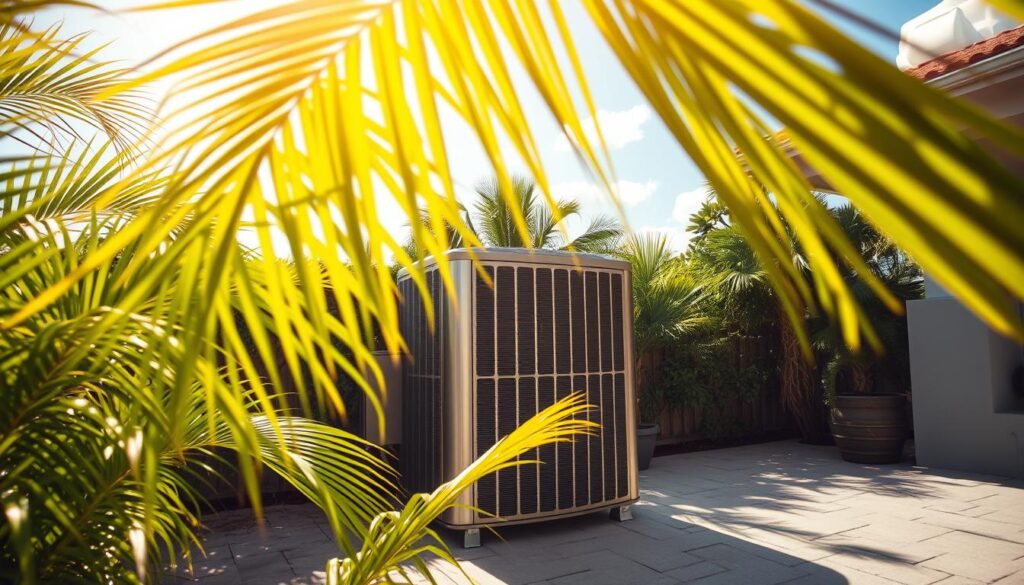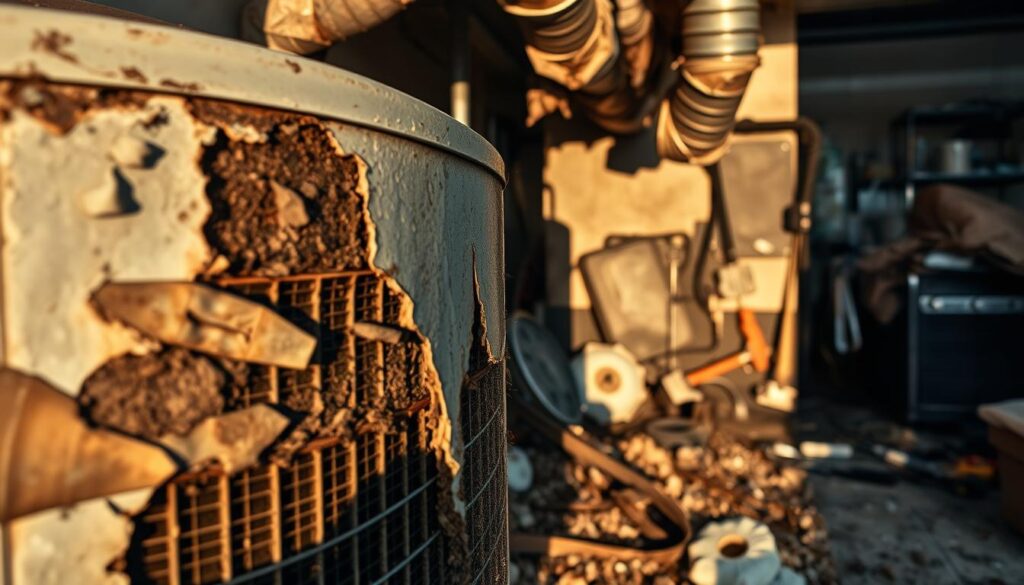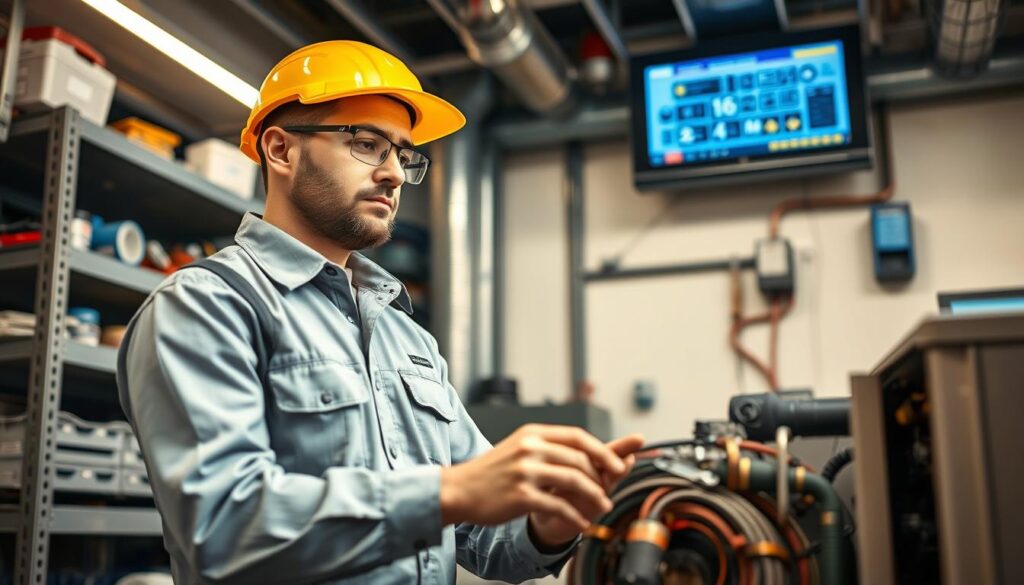Affiliate Disclosure
HVAC Guide Guys is a participant in the Amazon Services LLC Associates Program, an affiliate advertising program designed to provide a means for sites to earn advertising fees by advertising and linking to Amazon.
How Long Do HVAC Last in Florida? Ever wondered why your HVAC system works harder in Florida’s heat? Knowing how long HVAC systems last in Florida can save you a lot of money. It helps avoid unexpected replacement costs and keeps energy bills down.

In Florida, HVAC systems face special challenges that shorten their lifespan. They usually last between 10 to 15 years here. This is much shorter than the national average because of the extreme weather.
Florida’s intense heat and humidity make your HVAC system work even harder. This leads to more wear and tear. Coastal and inland areas have different effects on HVAC systems. So, regular maintenance is key to making them last longer.
Knowing when your system is starting to break down is important. By taking care of it early, you can keep it running well. This also helps avoid sudden breakdowns.
Key Takeaways
- Florida HVAC systems typically last 10-15 years
- Extreme heat and humidity accelerate system wear
- Regular maintenance can extend HVAC lifespan
- Coastal environments pose unique challenges to HVAC systems
- Early detection of performance issues prevents costly replacements
Table of Contents
Understanding HVAC Systems in Florida’s Climate
Florida’s climate is tough on HVAC systems. The heat and humidity are extreme. Your HVAC must work extra hard to keep your home cool.
- Extremely high humidity levels (often 80% or higher)
- Constant temperature fluctuations
- Potential salt air corrosion in coastal regions
- Extended cooling season requiring prolonged system operation
Impact of Heat and Humidity
Florida’s climate is hard on HVAC systems. The humidity makes them work up to 300% harder. High moisture content forces your air conditioning to continuously remove water from the air, which increases energy consumption and mechanical wear.
| Climate Factor | HVAC System Impact |
|---|---|
| Humidity Levels | Increased energy consumption by 50-75% |
| Annual AC Operation | 2,000-3,000 hours (vs. national average of 1,000) |
| Potential Corrosion Risk | Accelerated at 80% relative humidity |
Coastal vs. Inland Environmental Effects
Coastal HVAC systems face salt air challenges. They need protective coatings to prevent corrosion. Inland systems deal with intense heat and humidity, affecting performance.
Seasonal Strain Factors
Your HVAC system faces constant stress in Florida’s climate. Regular maintenance is key to prevent breakdowns and extend life. Professional inspections can spot early wear and ensure performance all year.
Explore Our HVAC Shop
Looking for top-rated HVAC tools, parts, and accessories? Visit our shop and find the perfect solution for your needs.
Visit the ShopHow Long Do HVAC Last in Florida
Knowing how long HVAC systems last in Florida is key for homeowners. It helps keep your home comfortable and saves money. Florida’s climate is tough, affecting your HVAC’s lifespan.
Average Lifespan Statistics
In Florida, HVAC systems don’t last as long as in other places. They usually last 10 to 15 years, which is shorter than the national average. Several factors contribute to this:
- Extreme heat and humidity
- Constant system usage
- Coastal environmental conditions
- Increased wear and tear
Regional Variations in System Longevity
The lifespan of HVAC systems in Florida changes based on where you live and how well you maintain it. In Central Florida, well-kept systems might last up to 15 years. But, coastal areas face extra challenges from salt air and high humidity.
Comparison with National Averages
Florida’s HVAC systems need to be replaced more often than in other states. While the national average is 15-20 years, Floridians might need to replace theirs every 10-15 years. Continuous use, high humidity, and salt exposure all play a role in faster wear.
Proper maintenance can extend your HVAC system’s life and improve overall performance in Florida’s challenging climate.
To make your HVAC last longer, follow these tips:
- Schedule bi-annual professional maintenance
- Replace air filters every 1-3 months
- Keep outdoor units clear of vegetation
- Invest in high-quality, climate-appropriate systems
Explore Our HVAC Shop
Looking for top-rated HVAC tools, parts, and accessories? Visit our shop and find the perfect solution for your needs.
Visit the ShopFactors Affecting HVAC System Durability
Your Florida HVAC system faces unique challenges that impact its durability and longevity. The state’s extreme heat, high humidity, and coastal conditions stress your air conditioning equipment.
Several critical factors influence hvac system longevity florida, determining how long your equipment will serve your home:
- Environmental Stress Factors
- Tropical humidity levels
- Constant high-temperature exposure
- Salt and sulfur in coastal areas
- Usage Patterns
- Frequency of system operation
- Extended cooling seasons
- Daily runtime intensity
- Maintenance Practices
- Regular professional inspections
- Consistent filter replacements
- Seasonal system tune-ups
The florida hvac durability depends on managing environmental and operational challenges. Experts suggest annual maintenance to prevent system deterioration.
“In Florida, your HVAC system is not just equipment – it’s a critical home defense against extreme climate conditions.”
Knowing these factors helps you make informed decisions about system care. This can extend your HVAC’s lifespan from 10-15 years to 20 years or more with diligent maintenance.
Common Signs of HVAC System Deterioration
Your HVAC system tells you a lot about its health through different signs. Knowing these signs can help you avoid expensive repairs and keep costs down. Florida’s hot weather makes it even more important to catch problems early.

Performance Indicators to Watch
Spotting early signs of HVAC trouble can save you money and avoid sudden breakdowns. Here are some important signs to watch:
- Inconsistent room temperatures
- Weak or reduced airflow
- Unusual increases in energy bills
- Excessive humidity inside your home
Critical Warning Signals
Florida hvac maintenance tips stress the importance of noticing these warning signs:
- Strange noises: Grinding, squealing, or rattling sounds
- Persistent musty odors
- Frequent cycling on and off
- Visible moisture or leaks around the unit
Energy Efficiency Changes
| Efficiency Indicator | Potential Problem |
|---|---|
| 10-15% increase in energy bills | Declining system performance |
| Constant repairs needed | System approaching end of lifespan |
| Unit over 10 years old | Potential replacement recommended |
If your HVAC system shows many warning signs, it’s time to call a pro. Regular maintenance can help your system last longer and keep repair costs down.
Essential Maintenance Practices for Florida HVAC Systems
Maintaining your HVAC system in Florida’s climate is key. The heat and humidity can hurt its performance and lifespan. With the right florida hvac maintenance tips, you can make your system last longer and save money on replacements.
Keeping your air conditioning system in top shape is vital. Here are important steps to protect your investment:
- Replace air filters every 1-3 months to ensure optimal airflow
- Clean outdoor units regularly, removing debris and leaves
- Schedule professional inspections at least once annually
- Check and seal ductwork to prevent energy loss
- Monitor indoor humidity levels
Florida’s climate is tough on HVAC systems. AC units in coastal areas face additional challenges from salt-laden breezes. It’s important for homeowners to keep their systems in good shape to fight off wear and tear.
Energy efficiency is key to a system’s long life. Here are some tips:
- Install a programmable thermostat
- Maintain consistent temperature settings
- Use ceiling fans to reduce cooling load
- Invest in regular professional tune-ups
A well-maintained HVAC system can last up to 15 years in Florida, compared to just 7-12 years without proper care.
By following these florida hvac maintenance tips, you can keep your system running well. This will improve energy efficiency and make your hvac system last longer against Florida’s harsh conditions.
Explore Our HVAC Shop
Looking for top-rated HVAC tools, parts, and accessories? Visit our shop and find the perfect solution for your needs.
Visit the ShopProfessional Service Requirements and Timing
Keeping your HVAC system in Florida in top shape is key. The hot and humid weather requires careful maintenance. This ensures your system works well and lasts longer.

Getting professional help is vital for your HVAC’s health. Experts say you should get your system checked at least once a year. It’s best to do this before summer starts.
Seasonal Maintenance Schedule
Florida’s weather means you need to act early on HVAC care. Here’s a good plan:
- Spring: Check your system thoroughly
- Early Summer: Get it ready for hot weather
- Fall: Look over your system after summer
- Winter: Do a quick check
Professional vs. DIY Maintenance
Some tasks you can do yourself, but pros bring more benefits. They can spot problems early, saving you from big repair bills.
Cost Considerations
Knowing about hvac repair costs helps save money. Regular checks can stop expensive fixes and make your system more efficient.
Think about these savings:
- Annual checks can cut energy use by 5-15%
- They can make your system last 10 to 15-20 years longer
- They avoid sudden, costly breakdowns
Professional HVAC care is a smart investment for Florida homeowners. It’s not just a cost; it’s a long-term savings.
Choosing the Right HVAC System for Florida Homes
Choosing the right HVAC system for your Florida home is important. You need to think about several key factors. The climate in Florida is unique, so you can’t just use any cooling system.
When looking at HVAC systems, focus on what makes them work best in Florida’s weather:
- SEER Rating: Look for systems with 16 or higher for top energy efficiency in Florida.
- BTU Requirements: Figure out your home’s needs based on its size.
- Humidity Control Features: These are a must for Florida’s humid climate.
- System Type: Decide between central air or ductless mini-split systems.
Florida is a Zone 2 area, so you need a strong system to handle the heat and humidity. For cooling, you’ll need 30 to 50 BTUs per square foot.
Pro Tip: A 1,200 square foot home usually needs about 24,000 BTUs to stay cool.
Energy efficiency is key. High-efficiency systems can save you money on bills and increase your home’s value. Getting a professional to install it is also important for its performance and life.
Don’t forget to keep your HVAC system in good shape. Change filters every 1-3 months to keep it running well and last longer in Florida’s tough climate.
Explore Our HVAC Shop
Looking for top-rated HVAC tools, parts, and accessories? Visit our shop and find the perfect solution for your needs.
Visit the ShopExplore Our HVAC Shop
Looking for top-rated HVAC tools, parts, and accessories? Visit our shop and find the perfect solution for your needs.
Visit the ShopEnergy Efficiency and Cost Considerations
Understanding the cost of your cooling system in Florida is key. The right choice can make your home more comfortable and save money in the long run.
Initial Investment vs. Long-term Savings
At first, an energy-efficient HVAC system might seem pricey. But, the savings are big. Florida homeowners can see big benefits from smart upgrades:
- Potential energy cost reduction up to 25% with higher SEER ratings
- Decreased utility bills through improved system performance
- Longer equipment lifespan with proper maintenance
Energy Rating Guidelines
Knowing about SEER (Seasonal Energy Efficiency Ratio) ratings helps you choose wisely. Modern systems are very efficient:
| SEER Rating | Energy Efficiency Level | Potential Cost Savings |
|---|---|---|
| 14 SEER | Standard Efficiency | Baseline Performance |
| 16-18 SEER | High Efficiency | 15-20% Energy Savings |
| 20+ SEER | Premium Efficiency | 25-30% Energy Savings |
Operating Cost Analysis
Florida’s climate means you need to think carefully about your HVAC. HVAC systems can account for over 40% of home utility bills. Lowering your thermostat by just one degree can increase cooling costs by up to 8%.
Investing in energy efficiency is not an expense, but a long-term strategy for home comfort and financial savings.
Modern HVAC Technologies for Florida Climate
Florida’s climate is unique, needing advanced HVAC solutions. Variable-speed compressors are a big leap forward. They control temperature and moisture precisely, saving a lot of energy.
Smart thermostats are another big step in energy efficiency. They learn your home’s heat patterns and adjust cooling to save energy. They also track humidity and weather, making them perfect for Florida’s climate.
Now, there are HVAC systems with special dehumidifiers for Florida’s high humidity. These systems can cut indoor humidity by up to 60%. This improves air quality and stops mold, making your home more comfortable.
Energy-saving HVAC tech keeps getting better, giving you more control over your home’s climate. Investing in these systems can cut cooling costs by 20-30%. They also make your HVAC last longer. The future of cooling is smart, efficient, and made for Florida’s tough climate.

